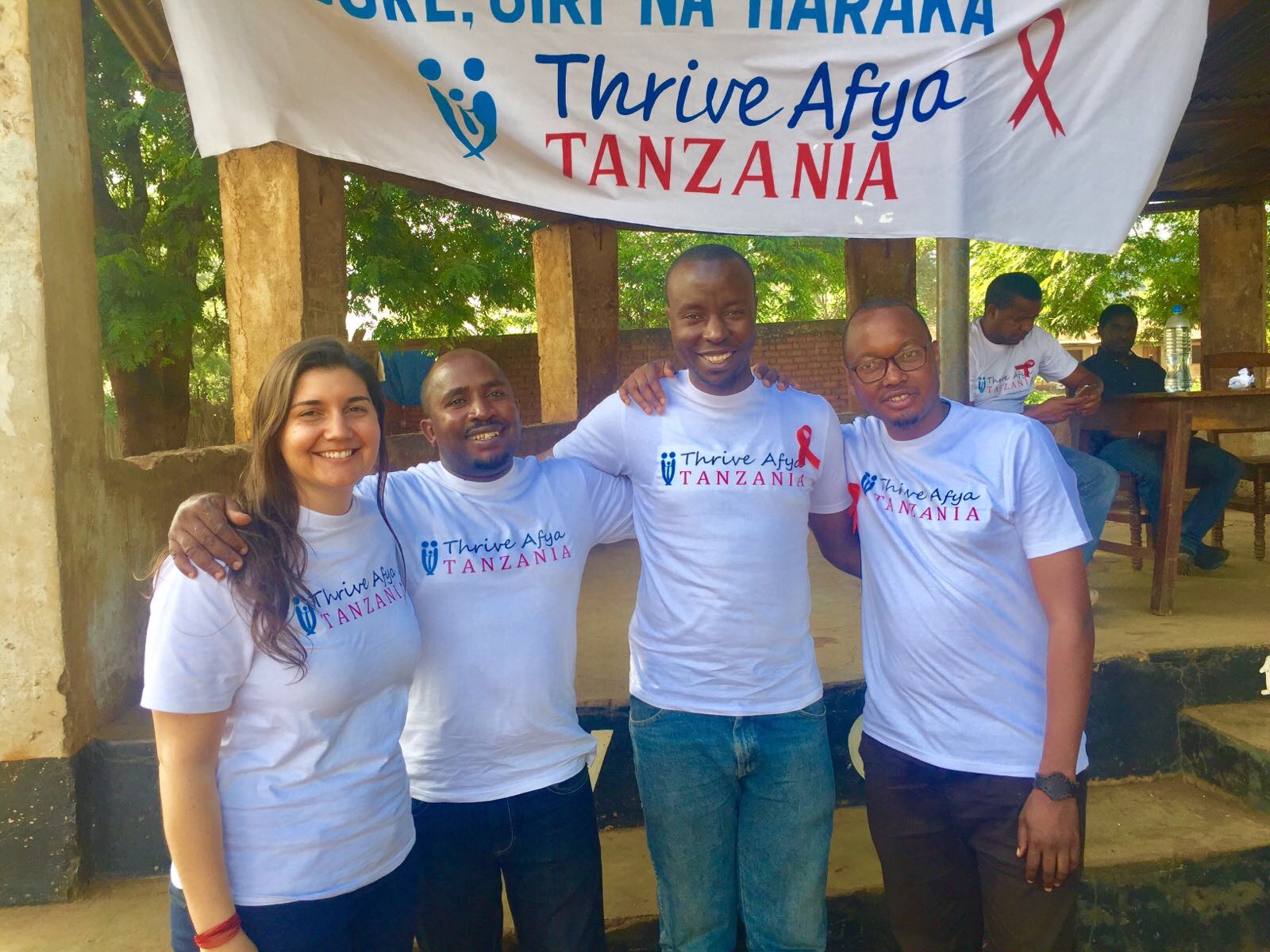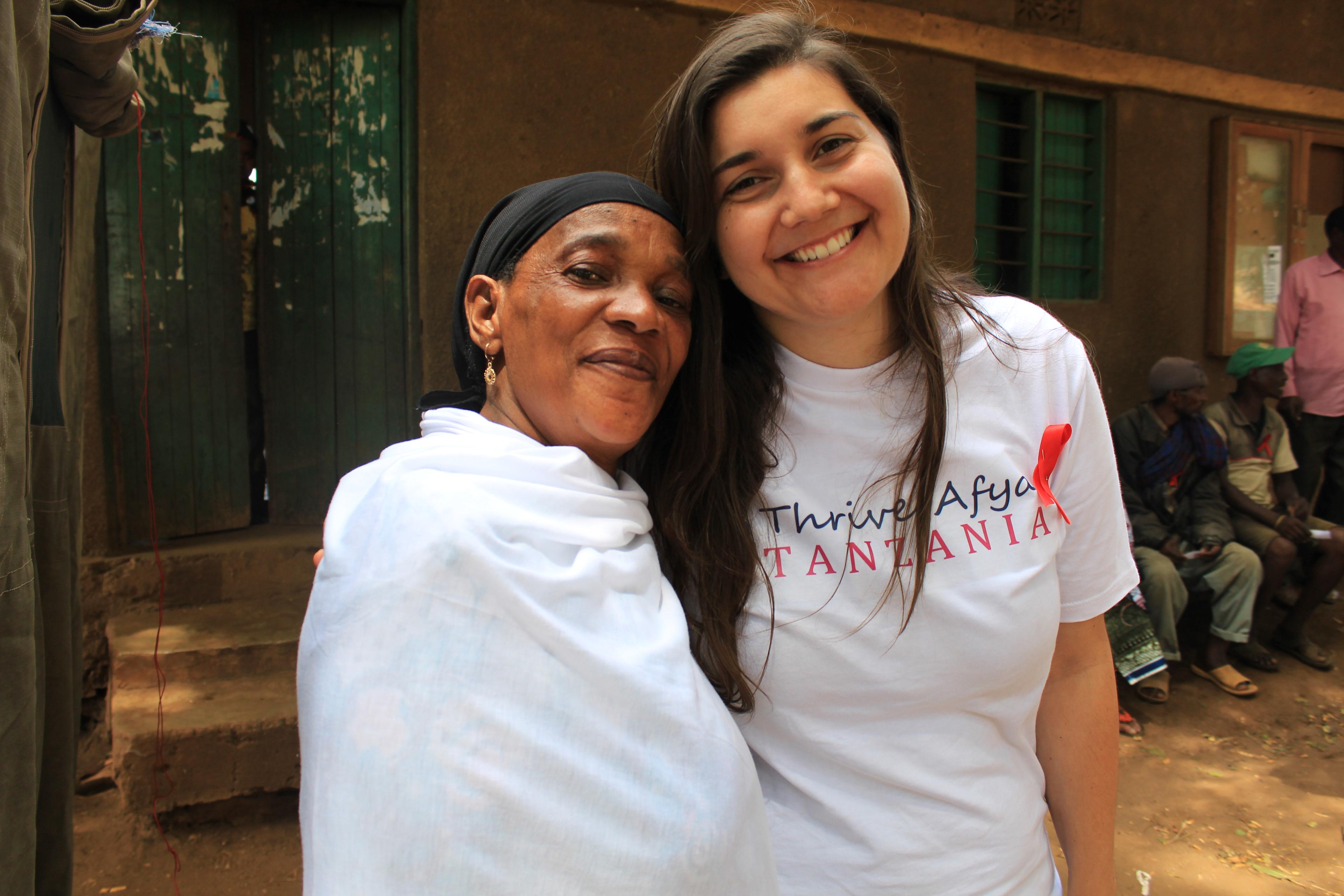
Simon Kaura, her husband Yusuph Mlaponi and Waziri Njau.
Like many in the global health professions, Katie Lesyna-Mlaponi believes that health is a human right.
“Unfortunately, in many places around the world, quality health services are a privilege, and not a right,” she said. “And no woman should die giving birth due to lack of access to resources.”
Lesyna-Mlaponi, a 2016 graduate of the UCSF Master’s Program in Global Health, is making a career of fighting for reproductive and maternal health rights.
While at UCSF, she researched human rights litigation and maternal mortality in Uganda. She was co-author of a paper, published last November in the journal BMC Pregnancy and Childbirth, on how human rights litigation can support global movements to improve women’s health.
Now, she is in Babati,Tanzania, where she co-founded Thrive Afya Tanzania, a non-profit organization that focuses on improving access to quality HIV/AIDS, reproductive and maternal health services.
“Tanzania is one of 10 countries that make up about 60 percent of global maternal deaths so maternal mortality is a huge issue here,” said Lesyna-Mlaponi. “There is also low family planning uptake due to availability issues and lack of education.”
In East Africa, unsafe abortion counts for an estimated 18 percent of maternal deaths, yet in Tanzania, abortion is only allowed to save the life of the mother, she noted.
“You also have many women delivering at home with unskilled traditional birth attendants, lack of supplies and medicines at health facilities, and a general shortage of skilled health workers,” said Lesyna-Mlaponi. “All of these contribute to the high rates of maternal mortality.”
The Thrive Afya Tanzania model includes a lot of mobile work to reach rural areas in Tanzania where there is poor access to health services. “Right now, our focus is HIV/AIDS. We provide mobile testing services, where we set up tents in various settings so people can get tested,” she said. “We found that we are able to reach more people through this approach because we are going to them versus having them come to us. We are planning to expand this model to a mobile clinic by integrating comprehensive family planning information and offering other services.”
Thrive Afya Tanzania approaches these issues holistically and will eventually provide vocational training and life skills development along with health services.
Lesyna-Mlaponi traces her interest in human rights and health back to her days as a high school freshman in 2004 in Los Altos, CA. “I remember becoming really interested after learning about the Darfur genocide in Sudan,” she said. “Around the same time, I started to love biology, and so human rights issues and health was a melding of some of my interests. My passion for global health grew from there and has continued to this day.”

Lesyna-Mlaponi started to focus on reproductive and maternal health during her sophomore year at Scripps College in Claremont, California, when she volunteered for Support for International Change (SIC), an HIV/AIDS organization in Tanzania.
“I became committed to reproductive health, inspired by people’s stories and the work SIC was doing in the communities,” she said.
After that summer work, she studied in Kenya and became interested in the disclosure process for children born with HIV, which eventually led to a Fulbright grant in Tanzania to continue that research at Muhimbili University.
From 2014-2015, Lesyna-Mlaponi worked at the UCSF Bixby Center for Global Reproductive Health as the Center assistant and program assistant for its Beyond the Pill program, which focuses on contraceptive research, disseminating educational materials, and facilitating health care provider trainings for long-acting reversible contraceptives (LARCs).
After receiving her master’s from UCSF in 2016, she co-founded Thrive Afya Tanzania, along with her husband Yusuph Mlaponi, and three other Tanzanian colleagues, Simon Kaura, Waziri Njau and Mershil Kivuyo. They all worked together at SIC, which had closed in 2015. “We decided to join hands and start a new organization that would fill the gap in HIV/AIDS services and expand to reproductive and maternal health services,” said Lesyna-Mlaponi.
She realizes that in Tanzania and other parts of the world the challenge to achieve full maternal and reproductive health for women seems daunting. “Maternal mortality is preventable, but it requires sustained efforts and commitment.”
Also, funding and resources – or the lack of these — is always an issue. “A specific commitment to designate funding to reproductive and maternal health research and programs is necessary to sustain efforts,” she said.
“The good thing about efforts to reduce maternal mortality is that it is a movement people can get behind,” said Lesyna-Mlaponi. “No one is opposed to preventing maternal deaths. There is no controversy behind that, but rather indifference.
“Unfortunately, people are not as open, in general, to two key interventions to reduce maternal mortality: access to family planning and access to safe abortion services. This causes the solutions to then be incomplete rather than holistic.”
One of her favorite quotes is from Mahmoud Fathalla, former chair of World Health Organization Advisory Committee on Health Research and a champion for women’s health. He stated: “Women are not dying of disease we cannot treat…they are dying because societies have yet to make the decision that their lives are worth saving.”
“While the quote is about 10 years old, it rings true today,” said Lesyna-Mlaponi .